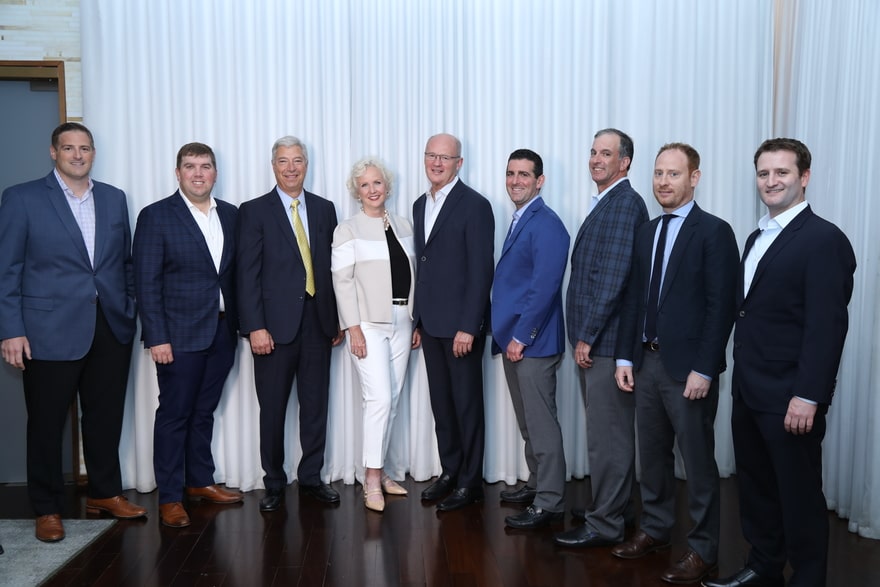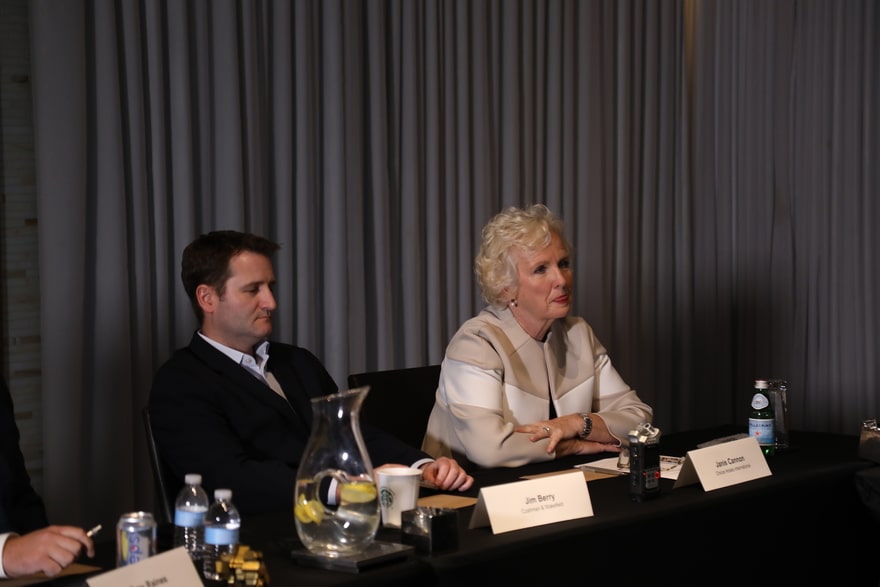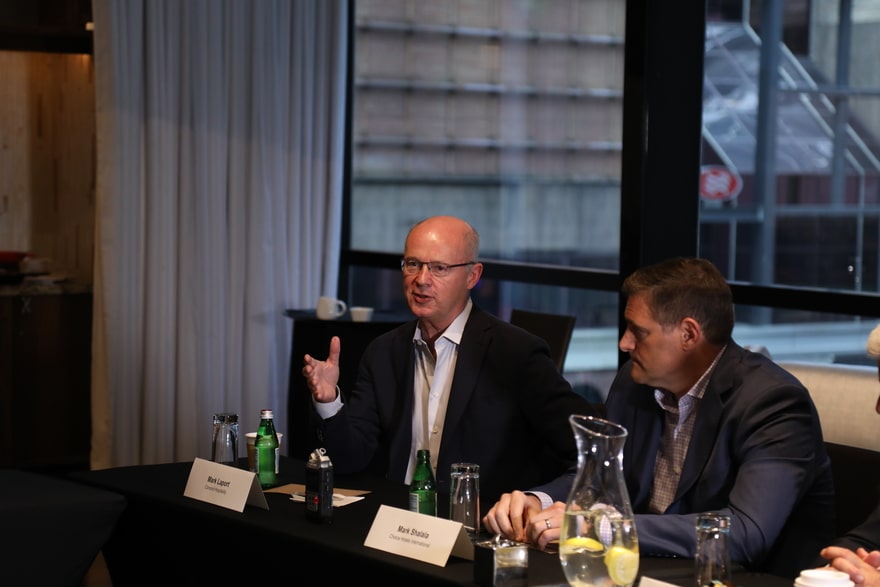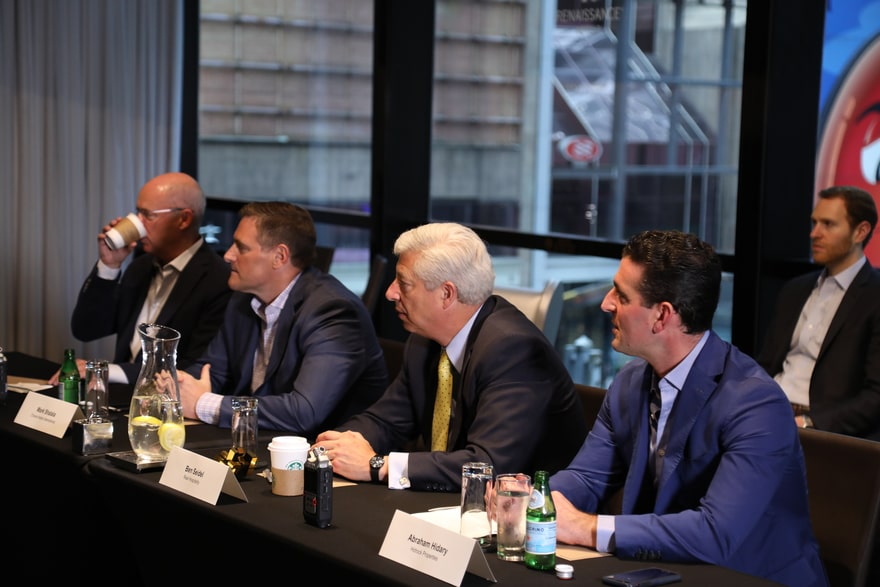
 Pictured from left: Mark Shalala, VP of development for Choice Hotels Upscale Brands Cambria and Ascend Collection; Grey Raines, president of Raines Hospitality; Ben Seidel, president of Real Hospitality Group; Janice Cannon SVP of upscale brands, Choice Hotels International; Mark Laport, president and CEO of Concord Hospitality; Abraham Hidary, CEO of Hidrock Properties; Michael Sonnabend, managing member of PMZ Realty Capital; David Eisen, former editor-in-chief of Hotel Management; and Jim Berry, executive director, Cushman & Wakefield’s Valuation & Advisory.
Pictured from left: Mark Shalala, VP of development for Choice Hotels Upscale Brands Cambria and Ascend Collection; Grey Raines, president of Raines Hospitality; Ben Seidel, president of Real Hospitality Group; Janice Cannon SVP of upscale brands, Choice Hotels International; Mark Laport, president and CEO of Concord Hospitality; Abraham Hidary, CEO of Hidrock Properties; Michael Sonnabend, managing member of PMZ Realty Capital; David Eisen, former editor-in-chief of Hotel Management; and Jim Berry, executive director, Cushman & Wakefield’s Valuation & Advisory.Hotel development is continuing at a comfortable pace this year, but the upscale segment continues to attract the attention of brands, developers and travelers. Upscale hotels continue to deliver the most favorable industry metrics across the board, including continued gains in revenue per available room, mainly through rate. For this reason, Hotel Management sat down with eight industry experts to discuss the upscale hotel development landscape, how full-service hotels have fallen by the wayside and more.
The upscale hotel segment has continued to grow year over year, and its recent success can be attributed to a number of factors. Janis Cannon, SVP of upscale brands at Choice Hotels International, said baby boomers nearing retirement and millennials nearing peak career-earning years are both pivoting to upscale hotels, which can explain some of the segment’s recent success.
“The top and bottom of the funnel are squeezing upscale in the middle right now, which is a really big part of what’s driving demand,” Cannon said.
According to Michael Sonnabend, managing member of PMZ Realty Capital, upscale select-service hotels in urban settings remain the most popular properties within the segment for guests, and therefore these hotels also attract a great deal of investor interest. Abraham Hidary, CEO of Hidrock Properties, said this segment’s strength makes it an ideal vehicle for hotel companies to launch new brands, and these brands have been met with elevated interest from both developers and guests.
Most of all, Hidary said, guestrooms in the upscale segment operate at a price point that allows hoteliers to experiment with offerings, something travelers have been on the lookout for.
“A lot of these upscale brands hit the balance right with regard to amenities,” Hidary said. “I think a lot of luxury hotels…are overdone with amenities that aren’t always used, or are not always profitable, and this segment really hit that right. That’s what the customer wants.”
 Jim Berry, executive director, Cushman & Wakefield’s Valuation & Advisory, and Janice Cannon, SVP of upscale brands, Choice Hotels International, discuss the growing consumer shift to upscale hotels.
Jim Berry, executive director, Cushman & Wakefield’s Valuation & Advisory, and Janice Cannon, SVP of upscale brands, Choice Hotels International, discuss the growing consumer shift to upscale hotels.In years past, the concept of an upscale hotel included a full-service element. However, as Sonnabend pointed out earlier, it actually is select-service hotels that are the most popular format with guests in the upscale space, something Mark Shalala, VP of development for Choice Hotels’ upscale brands Cambria and Ascend Collection, said is a main driver leading hotel companies and developers away from the full-service model.
“You’ve got a lot of today’s travelers that want an upscale experience, but they don’t want to have to pay for parking, internet, or be in a hotel where there’s a large conference going on,” he said. “They want to have a little more of an intimate experience and a product that reflects the location that they’re in and have that more of a local stay.”
While select-service hotels may be missing out on revenue from services offered at full-service properties, they are also able to dodge the costs. Additionally, Hidary said a hotel’s location is more important than its amenities, with location often being considered an amenity. In New York, for instance, the city is the reason most guests visit, not specifically for the hotel’s restaurant.
“[Upscale hotels] are no longer trying to be all things to all people, which is what we used to try to be,” Cannon said. “It’s really about focusing on that target and delivering for that guest.”
 Mark Laport, president and CEO of Concord Hospitality, and Mark Shalala, VP of development for Choice Hotels Upscale Brands Cambria and Ascend Collection, mull over the markets where full-service hotels are still viable.
Mark Laport, president and CEO of Concord Hospitality, and Mark Shalala, VP of development for Choice Hotels Upscale Brands Cambria and Ascend Collection, mull over the markets where full-service hotels are still viable.Large urban markets have captured the attention of hotel developers in recent years, but smaller suburban markets also have been targeted for construction. Jim Berry, executive director, Cushman & Wakefield’s Valuation & Advisory group, said that in order for an upscale hotel development in a suburban market to make sense it most often is positioned near a substantial corporate environment.
“If it’s a market where it’s more leisure-conscious, it’s going to be difficult,” Berry said. “You’re generally looking at the top one, two or three suburban markets in a given area… because the Monday through Thursday crowd is looking for services and amenities and is not so worried about how much they are paying because their companies are paying for it.”
Mark Laport, president and CEO of Concord Hospitality, said construction in these markets continues selectively. Developers often scout these locations for municipalities in need of growing commerce and office space and coordinating with local governments can improve the success of these hotel projects. Shalala added that a brand willing to be flexible with established standards often will have more success in these endeavors as well.
“We were just looking at a project where the developers asking us to see if we could remove some of the meeting space,” Shalala said. “It was a smaller hotel in a very tight urban market. We looked at it and collectively made a decision to waive that. This effectively breached the asset by a million bucks minimum in that market, based on our trade.”
 Shalala discusses how reduced consumer interest in full-service hotels is translating to higher occupancy and rates at upscale select-service properties.
Shalala discusses how reduced consumer interest in full-service hotels is translating to higher occupancy and rates at upscale select-service properties.With the hotel industry host to so many brands, developers may be unsure whether or not to pursue a soft brand over a hard brand in a given market. After all, guests are most interested in a property’s amenities, its location and how it ties itself to the local market, while developers are fixated on any concept that diversifies a market and works well in a specific niche.
Grey Raines, president of Raines Hospitality, said choosing a soft brand over a hard brand often comes down to how a hotel plans on delivering its story. This can be a challenge, he said, because hotel companies often pay lip service about delivering unique experiences while tying a specific brand to a property.
Raines said this level of control over a hotel’s concept often leads to over-homogenization in markets that are badly in need of new ideas. In addition, some midscale assets have shown the potential to move up in scale depending on changes made at the property level, but that might not always be easy to do—or possible—with a brand attached.
“We’ve worked with each of the brands, and we can tell Choice has been doing it the longest,” Raines said. “They understand what a soft brand brings to the table—and also what it doesn’t. That’s where we’re seeing some of our battles currently with some of the other companies. They want to be a hard brand. They want structure, and that’s not what we look for in a soft brand. We look for back-of-the-house support.”
 From left: Laport; Shalala; Ben Seidel, president of Real Hospitality Group; and Abraham Hidary, CEO of Hidrock Properties, compare and contrast soft and hard brands.
From left: Laport; Shalala; Ben Seidel, president of Real Hospitality Group; and Abraham Hidary, CEO of Hidrock Properties, compare and contrast soft and hard brands.As the roundtable neared its close, it became clear that what makes the upscale segment so effective for investment and so attractive for travelers is its flexibility. Because upscale provides more opportunities for creative investment, the segment has also been able to keep pace with consumer trends in technology, food-and-beverage and service.
Ben Seidel, president of Real Hospitality Group, hailed the industry’s response to these changes, but he also said hotel companies need to keep analyzing consumer behavior trends and get ahead of disruptors in order to remain successful in the future. Otherwise, he said, hotels run the risk of falling out of favor as game-changers such as Airbnb, Amazon and Uber continue to command market share.
“We all need to be giving some thought to what the cab drivers never thought about,” Seidel said. “We need to evolve to stay relevant. You can say what you want about Airbnb. I think we’re all looking over our shoulder. They’re changing our landscape probably more than most people know.”
Cannon brought up artificial intelligence and the concept of artificial concierges in hospitality. She asked the panel to begin thinking about the stages in which hospitality will begin to shift into something else, when the shift might happen and what that means for hotels touting “the human touch” as their ultimate export.
 Far left: Mike Sonnabend, managing member of PMZ Realty Capital, discusses the continued prominence of upscale hotels in urban locations.
Far left: Mike Sonnabend, managing member of PMZ Realty Capital, discusses the continued prominence of upscale hotels in urban locations.“The [companies] that are able to adapt and keep up with technology are going to be the long-term winners,” Shalala said. “You can fall behind really quickly with technology. It’s scary.”
Hidary’s perspective on the future is more positive. He said that, from a capital market standpoint, hotel operators, institutional investors and lenders are on different pages regarding the economy and hotel performance. He pointed to New York City’s uneven performance versus analyst expectations so far this year and stated his belief that there is room for the economy to continue improving, particularly hotels.
“For hotels, I think that we’re in an earlier inning than you think,” Hidary said. “There’s a lot of runway left. I think we’re going to see a ton of activity, higher prices, more lending and more development that’s coming.”
This article originally appeared in Hotel Management on September 19, 2018